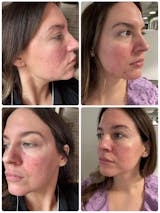It may be a cocoNO if you have acne-prone skin.
Coconut oil is to our skin what kale has been to our salads lately the super trendy cure-all for what ails us. And it's completely understandable, coconut is awesome AND heaps better smelling than kale. But for those of us who have more sensitive skin, we should proceed with a little more caution.
Why? Well, while the rest of the world is posting about coconut oil on their face like this:

Those of us with…uh, more high-maintenance skin, need to know this: Coconut oil scores ranks high on the comedogenic ratings. Now, if you're going “co-me-wha?”in your mind right now, you're not alone:
Comedogenic ingredients are those that, when applied onto our skin, provoke or exacerbate an excess of sebum (aka: face oil) on our skin. For those with already sensitive skin, this extra sebum stimulation can lead to higher production of bacteria (particuarily P.Acnes) on our face surface, which then leads to whiteheads, blackheads, and pustles. Aka: our face could feel like this (but likely less cool looking):

Fun right? Now, we at Clearly are not into scare tactics. We are in the pro-“the more you know, the better you can make decisions” camp.. As with anything in the world, the fact that coconut oil is high in comedogenic impact is just that: a fact. The question is what we do with that fact. Anything can irritate anyone if applied incorrectly or in varying amounts. So let's contextualize it for something useful: if you have acne-prone skin and want to jump on this latest trend, consider these options first:
- A patch test (just apply a little amount on your face as you would as part of your face-care routine) for at least 2-3 nights to see if there is a reaction
- Avoid your journey into coconut oil until AFTER your period (if you have one) as that's peak skin cray-cray time and the results may be masked by your hormones
- Consider an alternative for your face and use coconut oil on other parts of your face.
Alternatives to consider if you want to use face-oil but want something with a lower chances of irritating your skin? Argon oil, shea butter, or rosehip seed oil are all good options. Argon oil and rosehip oil are lightweight and absorbs easily while shea butter is a great option when you're traveling to drier, colder climates.
So verdict: coconut oil is still awesome but if you're acne prone, be aware it might be more irritating on your face. Test spot first before slathering the stuff on. Or: just stay on the safe side and use it for its beauty purposes that's less high-risk for you, like a hair mask, cuticle cream, or shaving oil. Promise it'll still look just as glam on your gram not slathered on your face.






